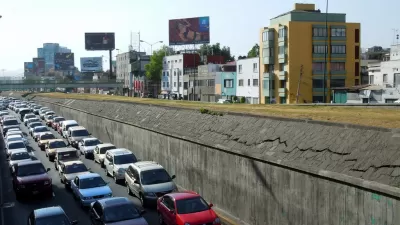Rapid urbanization and over-reliance on the inefficiencies of automobiles has set back the economies of urbanizing locations in the Global South, according to a new report.

Adela Suliman reports on the details of a new report detailing the costs of congestion in two cities of the Global South—Johannesburg and Mexico City.
According to the study by the World Resources Institute, the cost of rapid urbanization and motorization is congestion, which results in decreased access to jobs, services, and people. "Lack of access afflicts both low-income communities scattered throughout the city and low- to medium-income people living in suburbs and peripheral settlements who use private cars and motorcycles on long, congested commutes," according to a separate article by Christo Venter, Anjali Mahendra, and Dario Hidalgo for WRI.
As made clear by Suliman, the challenges described in the report extend far beyond the two case study cities: "Traffic is a 'chronic' problem in many developing cities […]with economic growth often prioritised above planning and the fallout most heavily felt by poor communities."
FULL STORY: In a jam: how traffic slows urban economies

Planetizen Federal Action Tracker
A weekly monitor of how Trump’s orders and actions are impacting planners and planning in America.

Map: Where Senate Republicans Want to Sell Your Public Lands
For public land advocates, the Senate Republicans’ proposal to sell millions of acres of public land in the West is “the biggest fight of their careers.”

Restaurant Patios Were a Pandemic Win — Why Were They so Hard to Keep?
Social distancing requirements and changes in travel patterns prompted cities to pilot new uses for street and sidewalk space. Then it got complicated.

Platform Pilsner: Vancouver Transit Agency Releases... a Beer?
TransLink will receive a portion of every sale of the four-pack.

Toronto Weighs Cheaper Transit, Parking Hikes for Major Events
Special event rates would take effect during large festivals, sports games and concerts to ‘discourage driving, manage congestion and free up space for transit.”

Berlin to Consider Car-Free Zone Larger Than Manhattan
The area bound by the 22-mile Ringbahn would still allow 12 uses of a private automobile per year per person, and several other exemptions.
Urban Design for Planners 1: Software Tools
This six-course series explores essential urban design concepts using open source software and equips planners with the tools they need to participate fully in the urban design process.
Planning for Universal Design
Learn the tools for implementing Universal Design in planning regulations.
Heyer Gruel & Associates PA
JM Goldson LLC
Custer County Colorado
City of Camden Redevelopment Agency
City of Astoria
Transportation Research & Education Center (TREC) at Portland State University
Camden Redevelopment Agency
City of Claremont
Municipality of Princeton (NJ)





























